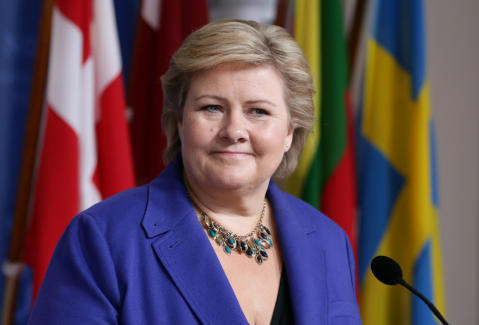
Norway needs to plot a new course as more economic engines are needed to propel western Europe’s biggest crude and gas producer out of the oil age, Prime Minister Erna Solberg said.
The Conservative-led government on Thursday presented outlines for a White Paper on industrial development, the first since 1981, that concluded that businesses will need to find more and more income outside the petroleum sector, which accounts for about 15 percent of the Norwegian economy.
Solberg is fighting for re-election in September after managing to rescue the economy from an outright recession amid the worst oil slump in a generation. But her efforts have come at cost. She last year became the first premier to withdraw money from the country’s wealth fund, which was set up more than 20 years ago to save oil income for future generations.
Norway now needs to ensure that it has a broad export and employment base outside its oil industry, Solberg said in an interview at Heroya, Norway. “We can’t just live as rentiers off the oil fund.”
The premier has previously warned that Norway will need to tighten its purse strings after she over the past years spent a record amount of the nation’s oil wealth. Oil revenue spending, and money taken from the wealth fund, is this year expected to reach about 8 percent of gross domestic product.
Solberg last month tightened the 16-year-old fiscal policy rule that limits spending from the country’s $900 billion wealth fund amid criticism she was pumping too much oil money into the economy. Combating the downturn, the government has also cut taxes by 21 billion kroner ($2.5 billion) over the past three years.
The government last month lowered its forecast for mainland growth this year to 1.6 percent from the 1.7 percent it forecast in this year’s budget.
The country’s non-oil industry has to a large extent benefited from a weaker krone since early 2013, but businesses can’t rely on that as the economy recovers, Solberg said.
“As long as we get stronger growth and a better economy it will impact the krone,” she said. “So in a way, it will be a sign of health that the market sees that the Norwegian economy is improving.”
Recommended for you
